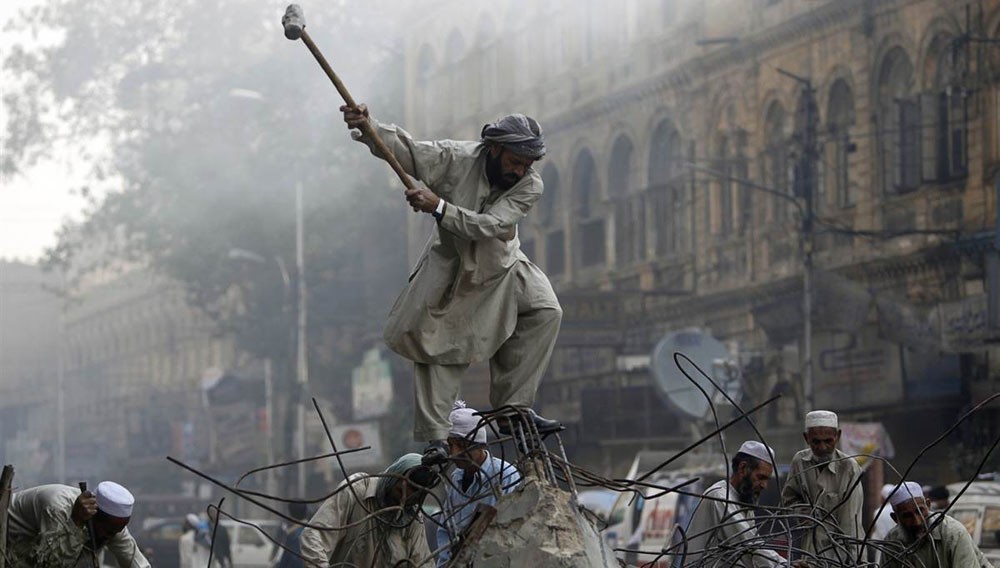
More than 3.5 million labour force is underemployed and unemployed in open market because of deepening gap between supply and demand of skilled manpower

Pakistan is becoming a hotbed of unskilled labour force pushing the embattled economy further down and frustrating all strategic planning being mapped out by financial wizards of the government. Deficit in demand-driven quality labour is the rub that hurts the economic indicators and comprehensive development in every sector.
Every successive government, including the present PML-N government, never realised the situation despite the fact Pakistan’s exports of merchandise missed the target by over $2.8 billion last fiscal year. Overall exports also suffered a negative growth of 3.5 per cent.
Economist Dr Farhan says the present government has yet to devise a crash plan to bridge widening gap of skilled manpower. "Pakistan labour market needs at least one million skilled capital of human resource to help Pakistan succeed in economic blueprint for 2015-16 envisioning GDP growth of 5.5 per cent," he adds.
Bureau of Statistics reveal that Pakistan needs skilled manpower in ten major areas including textile, agro-based industry, oil and gas, steel fixing operations, leather, services, livestock, dairies, nursing and general technicians.
Revamping links between technical institutions and industry to increase employability, upgradation of curricula, timely funding for professional and technical projects and promotion of around 3.2 million Small and Medium Industry Enterprises (SMEs) are the pivotal measures to prepare pool of required labour force for a healthy economy, says Farhan.
A senior official in National Internship programme spills the bean saying that percentage of unskilled workforce among the unemployed labour is alarmingly high. The official informs TNS that statistics show over 92 per cent of the unemployed labour constitutes unskilled people and the rest of 8 per cent are those who gained some education but lacks any skill.
As every cloud has a silver lining, Technology Upgradation and Skilled Development Company (TUSDEC) seems to be striving to make a turnaround. In collaboration with National Vocational and Technical Education Commission (NVTEC), Technical Education and Vocational Training Institute (TEVTA), plans are afoot to gradually minimise deficit of unskilled labour force in Pakistan.
The CEO of TUSDEC, Basit Maqsood Abbasi, tells TNS that in order to address the mismatch between skilled and unskilled manpower, the company has been implementing various programmes in realisation of the Vision 2025. "TUSDEC is harnessing and upgrading demand-driven technology and high-tech manpower capital employing effective use of scarce resources," he says, adding that it has implemented projects worth three billion rupees to substantiate industrial development and enrich human resources.
He informs TNS the company has partnered with Asian Development Bank (ADB) in establishing Light Engineering Support Centres in Lasbela, Hyderabad and Peshawar to supplement need-based manpower development and demand-based technical assistance for the local industry.
Abbasi says that with funding by EU, TUSDEC has been training 12000 men and women of marginalised background from KP and FATA for sustainable income generation through engaging private sector. So far 3000 trainees, he explains, have benefited from the programme.
"Other achievement is to capacitate 20 TVET institutes and develop curricula of 8 trades (dress making, hand/machine embroidery and building electricians, industrial electrician, refrigeration and air conditioning, motor cycle mechanic, solar panel technicians and generator mechanic trades), TUSDEC CEO claims. "It has trained 125 solar technicians and developed curricula for solar technology (photovoltaic and solar water heating system). It helps link graduates with private sector employers for employability."
To include women skilled labour in economy is also a daunting task that needs launching of an immediate programme. TUSDEC has planned to train 200 women under USAID Gender Equity Program Partnered with FWBL (First Women Bank) to provide enhanced income generation opportunities through training women from underserved communities of Karachi and Lahore in fashion design trades for socio-economic independence.
In the trades of electronic technician, industrial automation, computer administration and networking, fashion/textile design, dress making, interior design, merchandising and computer accounting trades, TUSDEC has trained around 500 unemployed youth, says Abbasi.
Meanwhile, Lahore Chamber of Commerce and Industry (LCCI) and Technical Education and Vocational Training Authority (Tevta) have teamed up to train quality skilled manpower for the industry.
Tevta Chairman Irfan Qaiser Sheikh tells TNS that focus on technical education is mandatory for GDP growth. "Upgradation of curricula may realise the dream of cutting deficit of skilled manpower in the country."
"Pakistan has a population of 190 million people with a large number of youth accompanied by expanding industrial sector. But, it is a matter of concern that both sides do not facilitate each other. Now Memorandum of Understanding (MOU) between LCCI and TEVTA may do wonders for the industry," Irfan hopes.
More than 3.5 million labour force is underemployed and unemployed in open market in Pakistan because of deepening gap between supply and demand of skilled manpower. The government must streamline its effort by teaming up TUSDEC, TEVTA, all chambers of commerce, economists and industrialists to do the needful before it is too late.
Besides, Pakistan is presently exporting poor and semi-skilled labour to Middle East and other countries who are just able to make small bucks as they are hired with little wages in comparison to other oversees skilled workers. Skill development of work force may help them earn better that will ultimately ramp up home remittances.